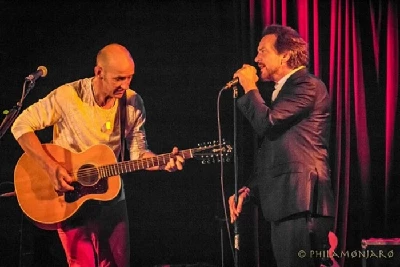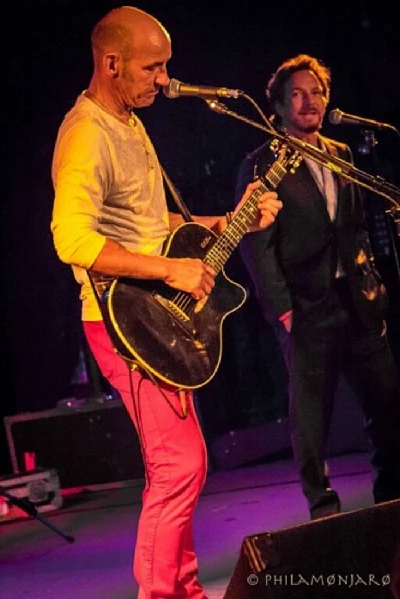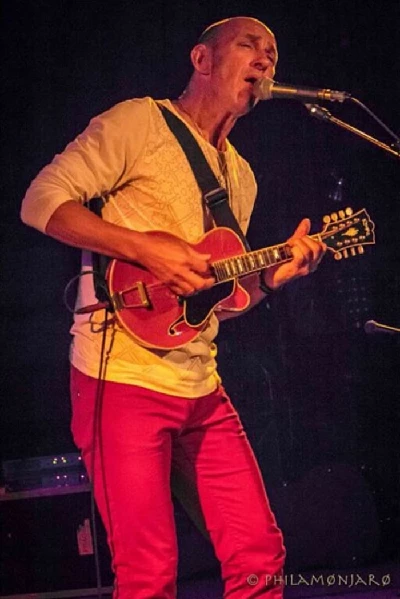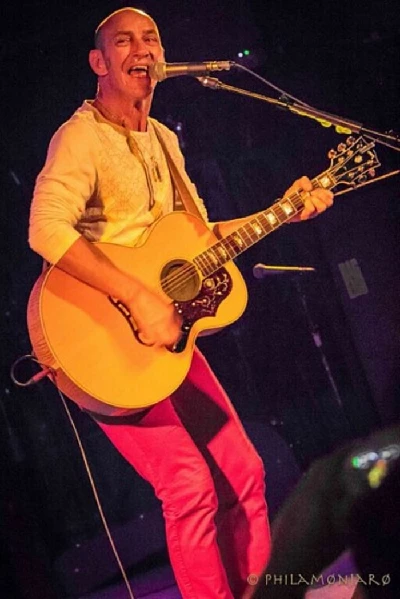published: 19 /
6 /
2015

Singer-songwriter Simon Townshend is touring with The Who, performing his solo act across the UK and North America and spreading the news about his current CD, ‘Denial’. He returns for his second riveting interview with Lisa Torem
Article
Do you want to hear about a really special singer-songwriter? Then pour yourself a cold one and kick off your shoes. Resist the mobile phone: this British troubadour demands your complete attention.
You might think he was supposed to be a famous songwriter/performer, that he was designed to be, simply because of his DNA. After all, Simon Townshend's father, Cliff Townshend, played brass in The Squadronaires and his mother was a youthful wartime vocalist. His older brother, Pete Townshend, is the legendary songwriter of The Who, the band that Simon joined in 1996. But, seriously, he could have come from a family of coal miners or muffin makers and the talent would have seeped out of him.
Simon appears to be perpetually living out of a suitcase, yet his reverence and restlessness for all things music never wanes.
His eighth and most recent album, 'Denial' (Stir Music, 2014) may be the most excruciatingly honest and heartfelt album you've ever heard. He performs with some old friends as well as a few new ones, giving his originals a full sound, yet the sentiments beneath the knobs remain as natural and gripping as ever. When we last spoke, Simon was still plotting out the tracks.
He's also been much sought-after at major venues, selling out New York's Joe's Pub and Chicago's Martyr's, and catering to growing UK and international audiences while always saving post-gig time to chat with fans and sign a CD. His growing fanbase appreciates his emotionally intelligent lyrics, as in 'Ecstasy Heaven,' 'I'm The Answer', and so many more - not to mention his biting modulations and always-in-the-moment stage persona.
Simon supported Canada's Heart on their 2013 'Fanatic' tour, Big Country on 'The Journey Tour' in the UK and frequently plays with Roger Daltrey for Teenage Cancer Trust fundraisers, as well as with Eric Clapton and Dave Grohl.
We last caught up with Simon when he released 2012's 'Looking Out, Looking In'. He was kind enough to share his current thoughts about what we fans considered one of his most personal albums, yet, what we did not know was that the dam had hardly burst open.
PB: Let's talk about 'Denial' - the first track is a conceptual detour from your previous themes. Is 'Mother' actually about your mum?
ST: It's not about my mother. I thought about the song through the eyes of my daughter. She had a pretty tough time a couple of years ago and just inspired that song. That's it really.
PB: And Hannah does the backing vocals on the song, too.
ST: She does. I've got her singing on it, which I thought was cool.
PB: Hannah's voice sounds lovely. Will she be singing on future recordings?
ST: I'd like her to do more. She hasn't had a great deal of experience in the studio, so I had to cajole her into opening up vocally. Yes, I'd love to do more work with her in the studio, actually. I'd like to get her to sing a lead vocal or two or some stuff, which would be a bit more complex. It would be fun to get something going.
PB: Another ballad on 'Denial' is 'Saving Grace'. On your CD cover, you acknowledged a family member named Grace. The line, "She's a daisy, a daisy grown from seed" makes it sound like it was written for a young child.
ST: My son, Ben, played drums on 'Among Us' (Stir Music, 1996) and 'Animal Soup' (Stir Music, 1999) and then he didn't play with me for a long time. He and his wife had twins and one of them died. Her name was Betsy Pearl, but the surviving girl was Grace, so we called her 'the saving grace.' That's where it came from, because I think without her, they would have been devastated. They were devastated anyway, obviously.
PB: I wanted to talk about your guitar arranging. Richard Thompson once said that many singer-songwriters just think of their guitars as strumming instruments, but that it's very important to master your instrument, not just play it. Your arrangements are like Bach inventions because each part: guitar, vocals, and lyrics can stand alone, yet they work together as one. How did you get to that point?
ST: Especially over the last couple of albums, I've pushed myself in that area more than ever. It's interesting, especially what Richard Thompson says, because I suppose I did neglect for a long time. During the early parts of my career, I think I did just play the guitar to write songs and it could have been a piano, it could have been any instrument. I didn't really feel the need to express myself as a musician. I just wanted to be the artist. But I think. along with my playing with The Who and along with my work, what came along when I started working at the level that I'm at now, with lots of charity work, you get thrown into situations where you might suddenly find yourself playing alongside Jeff Beck or Dave Grohl or someone fantastic and you think, are they going to want me to play a guitar solo, are they going to want me to jam along in the way that a musician does?
As I said, I always thought of myself as an artist, though, so I had to push myself a bit. I kind of locked myself away for a long time, played a lot of guitar and practiced a lot. It was around the time of 'Looking Out, Looking In' and I definitely started around that time, especially with that song. The guitar patterns on that song are so intense, but it kind of led me somewhere to thinking my live shows will be better because people will have something to listen to, instead of strumming along. And I knew that that was something I would be doing a lot more of, solo acoustic shows. And you have to make an instrument sound interesting in those environments because an acoustic guitar droning for an hour or so can start to bore people. You have to get something out of the instrument that is slightly different, something that's unique, even.
On my very first album, 'Sweet Sounds' (Polydor, 1983), I was possibly doing a bit more on a song called, 'Mr. Sunday' - I used to do Indian phrasing, but I've taken it to a different level and it's really helped me make my live shows exciting.
PB: The bass on 'Time Bomb' is another good example of that unique, instrumental quality. Did that arrangement come to you at once?
ST: Yes, it came really quickly. A friend of mine had a heart attack at 40 years old and the song just came to me out of the blue. Phil Spalding did all the bass. I tend to put down bass parts myself, just playing a keyboard or playing a bass, myself and then have someone replace it. I do like to have a proper bass player because you have to take slightly different sides of the fence with a bass. You have to underpin stuff. What you don't want is lead bass, where it's straying off the root note.
Phil Spalding's a monster; he's a fantastic player. He just did the perfect parts for me.
PB: Through playing with The Who, your touring band and your other projects, you've put yourself in the position where you have to play rhythm, lead and, well, everything. Is that rewarding?
ST: Playing my own solo stuff over the top, I find very rewarding. Like I said, it's something I really couldn't do too much of in the past. It's great. And I also feel I've taken a giant step in the last decade in that department. I'm proud of myself. I put the effort in.
PB: When did you start your solo act?
ST: I started playing solo shows around 1994 - before that I was always in a band. I've always written a lot of ballads and a lot of slow songs. Doing live shows, you have to keep things a little bit upbeat. Obviously, you can still put ballads in and slow songs, but you've got to have a certain amount of energy and life and that's where I've just learned so much over the last ten years: how to control an audience, by using beat and rhythm and keeping it alive and fresh, really.
PB: Your songs are very well crafted and they often incite visuals. For example, when I heard you play, 'Bare Essence' the other night, I actually saw, in my mind's eye, a Michelangelo-like figure sculpting a David. That song really has an interesting shape.
ST: It's a strange one. The song has been around for quite some time. I wrote it in the late '90s. It was quite simply, I was out and I got talking to somebody in a bar and it was after a show. It wasn't a Who show, we were doing the British Rock Symphony Tour in America. I was talking to someone and their eyes completely reminded me of my wife, when I met her. It was almost exactly the same, just the eyes. That's where it came from. "Those eyes".
PB: It's a very cinematic song. The way you parse out the phrases brings to mind the pacing of a film noir.
ST: I love that song. It's actually a lot of people's favorite song, I think, that I've written. I'm proud of it.
PB: I heard a shampoo commercial recently, which used a popular British Invasion song. How do you feel about the lives of your songs once they're truly out there in the world? Do you feel protective of their messages? Would you license them for commercial reasons?
ST: It's a shame you have to go down that road. A lot of times it's financial, isn't it? It's odd putting a great song to a tyre commercial. The Who were joking that that Johnny Cash song, 'Ring of Fire' could be a song used for something for your nether regions and it would work perfectly, but it would just ruin the song forever and everyone who ever heard it from then on would relate it to someone who's got a problem in that department.
People take music and they place them with certain products and I think it does cheapen the song, immediately, but it's an income stream that some musicians and artists have to take in order to keep going, especially nowadays because you're not making money on sales anymore. It's all downloads and the profits are almost gone. Bands are making money now selling concert tickets, rather than plastic. So when you get an offer like that, it's hard to turn down.
PB: At Martyr's, the surprise guest, Eddie Vedder, ran up on stage to perform two of your originals. You've also supported him at Pearl Jam Concerts over the years. What was it like to harmonise and hear your originals performed by him, live? Do you generally like the idea of having other singers interpret your songs?
ST: It's great, especially Eddie, because he's got an incredible voice. I really like it. It's something perhaps I should push further forward now as I'm getting older: push some of the songs into other singers' hands, but then again, when I come up with a new song, I want to do it myself (Laughs).
It's how it works for me, really. It's all about me and if I can create something new, it's often with me in mind. I've never really written for other artists and that's a fact. I've really sort of always written for me, so to make that transition might be quite difficult. I don't know how I'd fare in that. I perhaps should write something for Eddie one day and see whether he would cover a song by someone else because I know that the band writes their own music. It could work and it's something I would consider.
PB: Would you consider collaborating with other songwriters?
ST: Well, again, the same thing applies. It's funny. I've never really done that and when I have tried to collaborate with other writers, the few times I have, it's just not clicked. What it comes down to, is, being able to open up and share the experience and listen to what somebody else has to say, rather than it all coming from me. I find it really hard. I've got to be honest. I find that difficult.
I know so many people are the opposite. They can sit down with someone and write a song. The other thing about it is, it's all on command, isn't it? Let's meet up at one o'clock and write a song. For me, I can't just sit down and write a song. I need to be inspired and it really has to write itself in some way. So I think this sort of meeting and sitting around the piano and expecting to produce something is kind of odd. The whole thing is strange to me.
PB: As for being a producer, you've self-produced your albums for the most part. Is that always preferable to using an outside source?
ST: Absolutely. Yeah. All my songs are very personal. And they all have a deep meaning, especially on this 'Denial' album. It's like the record was written in pain, because my family was going through such intense time as I said about Ben and his child, but my daughter, as well. She was in a really bad way and having her back was the greatest thing, really. And my friend, having a heart attack. All these different things that came along, all in a very short space of time and the album just sort of wrote itself and I think that's what makes it special. It didn't take too much effort to produce it.
PB: You largely worked with musicians you've known over the years, but Greg Pringle is the newest person you've recorded with, isn't he?
ST: Greg played on 'Mother' and 'Gone', as well. Tony Lowe and I have been playing for a long time. I bring him in to help here and there. He plays a little guitar, just to give me a third dimension. It kind of works with my music to have him in there.
Like I said, Phil Spalding is kind of a rock for me, on bass. He's just an astounding musician, a really strong player. I did have Mark Brzezicki play some drums—it's been a long time since I've played with Mark. I think what Mark did on this recording is that he thought of it through Ben's eyes, how Ben would have recorded it, because I couldn't use Ben at the time and I really wanted to. He was just too tied up with a new job he'd got. He's not drumming at the moment and I think Mark just helped me by keeping it simple. That's where Ben comes from, keeping it simple.
PB: Tony Lowe plays sitar on the record.
ST: Yes. He plays sitar on 'Saving Grace.'
PB: There's more of an ambient sound on 'Denial' than on your former albums.
ST: Yeah. Certainly. I did the tracks in a studio in London (Woodgrange Studios), where I normally would have done it all in my own studio. I wanted to improve the drum sounds a bit, so I went with Mark Campbell and used his studio in central London and just put down the basic tracks with him and so I guess it's a slightly better sound than I would normally have, whether that's a good thing or a bad thing, I don't know. It certainly was what I wanted to do, to improve things a bit.
PB: What's the theme of your next recording?
ST: I'm going to do an acoustic album. I'm probably going to cover songs from the past, rerecord them in a new way, maybe live or recorded with some drum machine. I just want to do something a little bit different, or live percussion, perhaps. I just feel that there are a lot of songs that I would like to reapproach in a stripped down format as I'm doing so much acoustic work live, I think it would be a good way to support the next year. I've also got the tracks that I've recorded recently with Eddie, as well, to put out, so I'll put those on a new acoustic album, as well.
PB: How are things going with The Who tour?
ST: It's all good. The shows are going great. We did have to pull three shows for Roger. He's had a bit of an illness. I think he caught a bad cold, basically, which affected his voice, so he pulled three shows. They've been rescheduled and we'll be adding more shows to that schedule, as well.
PB: Do you generally perform a solo show between concert dates as you did in Chicago?
ST: It's worthwhile doing that because the people are in town generally for The Who show, so I'm often introducing myself to new people, to try to pick up new fans and it's a good chance for them to come see me. It's logistically quite difficult, quite tiring. Bear in mind that I have to get equipment from one place to another and if I'm working with them, I have to take it from The Who after one show and carry it myself to the next solo show and then back to the next Who show, which is in another city. It's all logistics.
PB: You do everything yourself. You don't use a guitar tech, do you?
ST: It's solo shows. If I'm going on tour, I take a tech with me, but for one-off shows, there's just nothing to it. I take a couple of six-string acoustics, a twelve-string and a mandolin. It's all very simple, really. When I'm on tour, I take a guy I've got in England and I have a tech on The Who shows as well. When I've got solo shows, it's quite easy.
PB: Do you use alternative tunings when you write?
ST: Sometimes, but not as often as people think. I use my thumb to fret bass notes and play open strings a lot, so it's not open tuning as such. There are one or two that I retune for, not anything like the amount people think. It just sounds like that in my style.
PB: Do you see yourself writing for film in the future?
ST: I'd like to. I've been talking to Adam Sandler's company about doing music for them. He's a big fan. They've already tried to place some of my music in some films. It's very difficult. Every time a piece of film comes along they have, for every minute or thirty seconds of film, about a hundred pieces of music being submitted. It's quite hard getting into that. I would love to, though. I would love to write, whilst watching film. That would be such an interesting thing to do, but it's not easy to get into that.
PB: So if you could be a super hero, what powers would you like to have?
ST: I'd like to be able to fly.
PB: Where would you go?
ST: I don't know. I'd fly everywhere. I'd fly around the world. I'd fly in space.
PB: Thank you.
Photos by Philamonjaro
www.philamonjaro.com
Band Links:-
http://www.simontownshend.com/
https://www.facebook.com/SimonTownshen
https://twitter.com/simont40000
Picture Gallery:-


